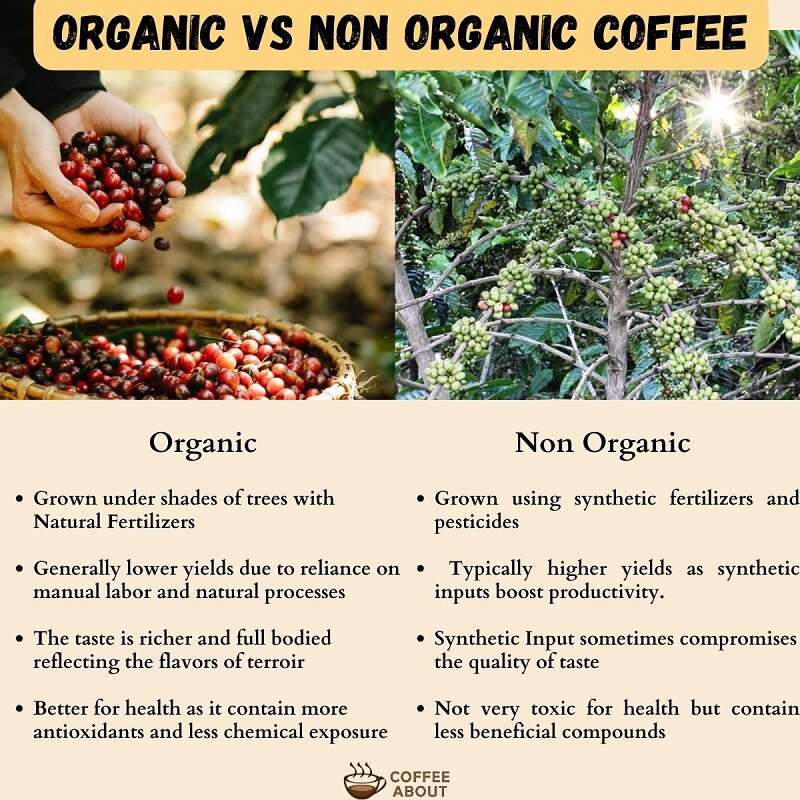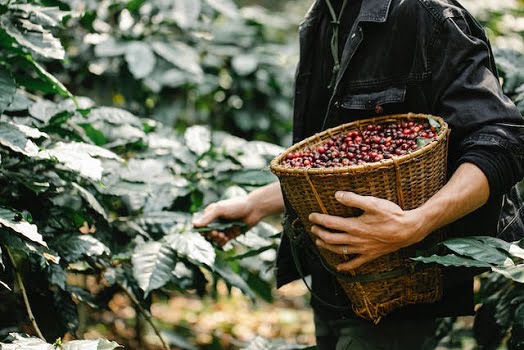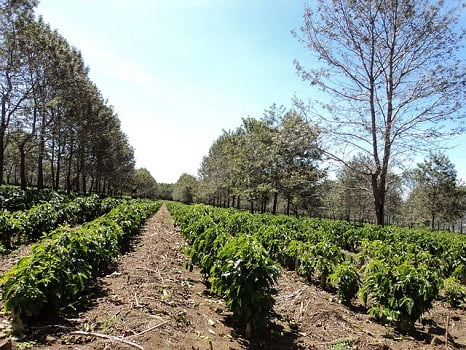Organic coffee is completely chemical-free and cultivated using sustainable practices that enrich the soil and protect the environment.
Though pricier and lower-yielding than conventional beans, organic coffee is steadily gaining popularity thanks to its pure taste and ethical production methods.
Key Takeaways
- The main difference is Organic coffee is grown without synthetic chemicals, while regular coffee uses pesticides and chemical fertilizers.
- Organic beans can taste more pure and flavorful compared to conventional coffee
- Organic Coffee is more expensive due to lower supply while most of the coffee is grown using conventional practices to maximize productivity.
- Organic Coffee is Healthier as it is not exposed to any chemicals and contains more useful antioxidants

What is Organic Coffee?
Organic coffee is cultivated naturally without the use of pesticides, synthetic fertilizers, or herbicides. It is usually grown under the shade of dense forests, providing an eco-friendly system for the plants and animals and keeping the environment sustainable.
USDA has strict criteria for Organic Farming and Processing. An organic seal or label is applied to certified organic coffee packages by the USDA. This identifies the coffee as legitimately organic.

Here are the key criteria for organic coffee production:
- Fertilizers must be 100% organic – no synthetic chemicals allowed. Common organic fertilizers include compost, coffee pulp, chicken manure, etc.
- Minimum 3 years of cultivation using only organic fertilizers and natural pest control methods before certification. This allows the soil to regain its natural fertility.
- A sustainable crop rotation plan is required to prevent soil nutrient depletion and erosion.
- Pests must be controlled using natural methods, not chemical pesticides.
- Processing and packaging of the coffee beans must be done without any artificial ingredients or chemicals.
What is Regular/conventional Coffee?
Regular coffee is grown by using chemical fertilizers and pesticides. It is produced to meet the massive worldwide demand for coffee. Big commercial farms use every trick in the book to maximize their coffee cherry harvest – hybrid plants, chemical fertilizers, pesticides, the works!
Conventional coffee farming is all about efficiency. That means:
- Fumigating the soil to nuke fungi and clear the deck for their plants
- Dosing fields with synthetic fertilizers to crank up growth
- Soaking seeds in insecticides before planting to ward off bugs
- Spraying down plants with chemical pesticides to avoid losses
This commercial approach lets non-organic brands churn out affordable, widely available coffee at scale.

Is Non-Organic Coffee Dangerous?
Yes, non-organic coffee comes with some real downsides. Synthetic Pesticides and insecticides sprayed on conventional coffee farms linger on the beans and get absorbed into plant tissues. Roasting and brewing bring some of those chemicals straight to your cup!
Meanwhile, farmers breathe those chemicals all day working in the fields. Surrounding communities deal with chemical runoff in their air and water too.
And to grow fields of chemically-dependent coffee, forests are mowed down rapidly to make room for more high-yield coffee plants in neat little rows. This destroys wild habitat and biodiversity.
Some even say those chemicals and rushed growing methods make for bitter, burnt-tasting beans.
I am not saying Non-Organic or Conventional Coffee is completely evil. In some places, conventional practices are a need. For example, we can’t eliminate coffee-killing fungus without applying synthetic insecticides or herbicides.
Benefits of Organic Coffee
Here are the 4 benefits of organic that I am sure will convince you to switch to Organic Coffee.
1. Organic Coffee Tastes Better
Organic Coffee tastes better because it is grown naturally in the shade, nourished by rich, chemical-free soil. You really get to taste the pure and true flavor of those beans. No pesticides or artificial fertilizers get in the way!
Many people say organic beans produce a more full-bodied and deeply satisfying brew, with nicely balanced flavors and crisp, clean acidity.
However, some people claim that there is no difference in taste. To me, organic coffee tastes sweeter because I know it’s good for the planet.
2. Organic Coffee is Healthier
Organic Coffee is better for your health compared to Nonorganic coffee as no chemical residues leach into beans – just natural, wholesome compost and fertilizers are used to nourish the plant.
Research shows organic beans have higher levels of polyphenols, minerals, and antioxidants that your body needs. And without any synthetic additives, organic coffee provides pure nourishment.
Non-organic coffee goes through a wash process so it’s also not super toxic. But organic still packs an extra nutritional punch over conventionally grown.
3. Good for the Environment
Organic farms use sustainable growing methods like shade cultivation, which preserves forests and natural habitats. This aids wildlife conservation and prevents soil erosion too.
Meanwhile, regular coffee is grown in the open sun to maximize yield, which often means clearing forests and deforestation to make space.
Non-organic practices also pollute the environment and water through the runoff of synthetic fertilizers and pesticides.
4. Supporting the Farmers
Organic farms are often Fair Trade certified. This means farmers receive fair wages and have safe, ethical working conditions.
The farmers don’t have to breathe in nasty chemicals either which can be detrimental to their health!
Organic Coffee Buying Guide
When buying organic beans or grounds, flip that bag over and check for legitimate certifications. In the US, the USDA Organic seal means those beans were grown to federal standards without synthetic pesticides or fertilizers.
Rain forest Alliance and Fair Trade labels are important too but don’t assume it’s automatically organic – almost 80% of fair trade coffee is not organic.
Ask about their sourcing and the farm’s certifications if buying from a local roaster. Traceability is key – any ethical coffee seller should be able to tell you details about where the beans came from and how they were produced.
And remember, just printing an “organic” label on the bag doesn’t cut it. Many fraudulent companies are doing that without following the regulations. To ensure that your beans are truly organic, look for the 100% organic USDA label.
Why is Organic Coffee Expensive?
Expect to pay higher prices for Organic coffee. It is 2-3 times more expensive than conventional non-organic coffee, because:
- Getting certified organic from organizations takes money.
- Organic farming practices often result in lower yields also organic farms are more susceptible to pests and diseases.
- In Organic cultivation, Weed control, pest management, and harvesting often require more hands-on effort, contributing to higher labor costs.
- Lately, the demand for organic coffee is growing faster than the supply, contributing to higher prices.
Also Read:
- What is Single Origin Coffee
- What is 3rd Wave Coffee
- Washed vs Natural Coffee
- What is Fermented Coffee
- Best Organic K cup Coffee Pods
- What is Honey Processed Coffee
Final Thoughts
I’ve covered all the differences between Organic Coffee vs Non Organic coffee in this article.
Organic Coffee is definitely worth buying if you prioritize sustainability, taste, and purity in your coffee drink.
Does organic fit into your routine or do you prefer conventional coffee? I’d love to hear your perspectives in the comments.
FAQs
Is all coffee organic?
No, all coffee is not organic! Only around 5% of Global coffee is certified Organic.
Coffee is the most consumed beverage and to keep up with the demand most coffee is grown using conventional, non-organic practices.
Is organic coffee higher in caffeine?
No, organic coffee doesn’t contain more caffeine than regular coffee. In fact, Organic Beans sometimes contains less caffeine than conventional coffee.
Caffeine mainly comes down to the specific coffee variety and origin – the Robusta variety has more caffeine than the Arabica variety.
Is organic coffee less acidic?
Yes, organic coffee is often a little less acidic than non-organic. Without synthetic fertilizers and harsh processing methods, organic beans tend to retain their natural smoothness and balanced acidity.
So for coffee drinkers with sensitive stomachs or acid reflux issues, the mellower acidity of organic can be easier on your gut.



